Kyoto slammed for manga telling people not to talk at restaurants
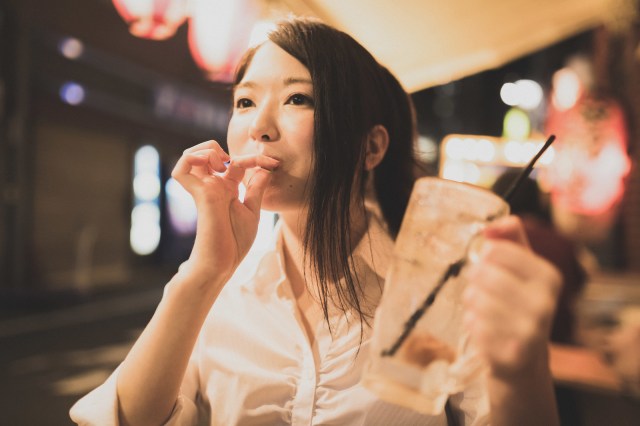
Four-panel manga fires up the Internet.
Ever since the pandemic began, Japan has been targeting restaurants as one of the primary risk spots for infection, with the main reason being that people inevitably have to remove their masks to eat.
And while some local governments have been asking restaurants to close their doors early at 8:00 p.m., to prevent diners from overdoing it on booze which tends to lead to loud talking without masks, the coronavirus doesn’t just come out at night, so people are now being asked to practice “mokushoku“, or “silent eating”, no matter what time they eat out at a restaurant.
While this seems to make sense, seeing as COVID-19 is an airborne virus, some people have been pushing back against the idea, even in Kyoto, where the city has now introduced a four-panel manga to help promote silent eating.
▼ The four-panel manga was shared on Twitter by the Kyoto City Information Centre on 12 February
市民の皆様に,新型コロナ感染を「自分ごと」として感じていただこうと, 4コマ漫画を作成。第7弾は「新しいコミュニケーション!?編」をお届け。
— 【公式】京都市情報館 (@kyotocitykoho) February 12, 2021
食事中は静かに,会話はマスクごしに。みんなで協力して,安心な環境をつくりましょう。
■4コマ漫画は,以下のURLから。https://t.co/fNdFepLAEB#黙食 pic.twitter.com/cFyG7F4dch
In the first panel, a character called “Isamu” enters a ramen restaurant and notices it’s quiet inside, even though a family is eating there. On the wall beside them is a blue poster, with “mokushoku” written on it in kanji, which asks people to eat in silence. These blue posters are being used a lot these days in restaurants and they’ve been widely shared on social media.
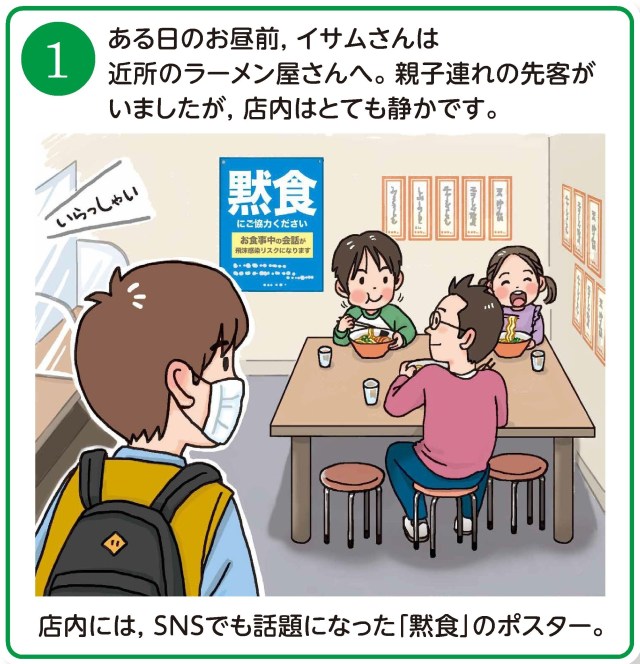
While Isamu waits for his order to arrive, he sees the family communicating to each other via smiles and hand gestures to express their thoughts on how good the meal is. Two of them give each other the thumbs-up sign while the other family member puts their hands above their head to form a “maru” circle, a gesture used to mean “good” in Japan. Isamu thinks to himself, “So this must be silent eating. This is great!”
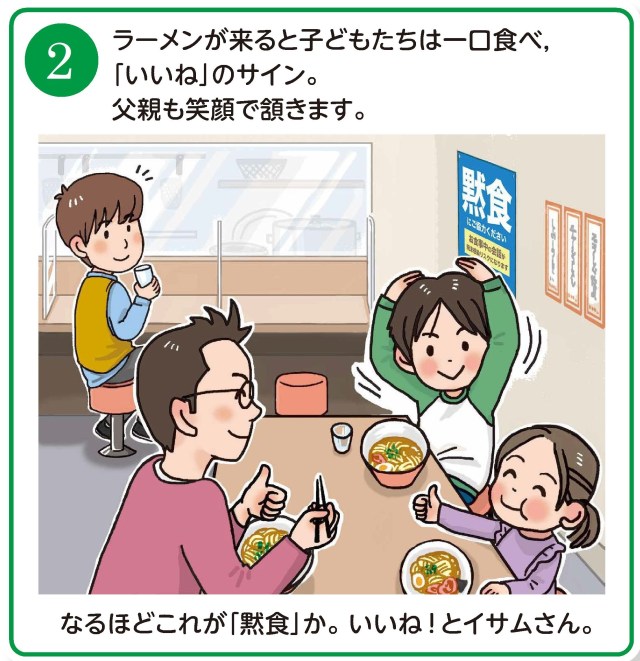
When Isamu eats his ramen, he follows the example shown to him by the family, giving the staff a thumbs up while thinking “It’s delicious!” The staff smile in return and he feels that the meal enjoyed silently is really tasty.
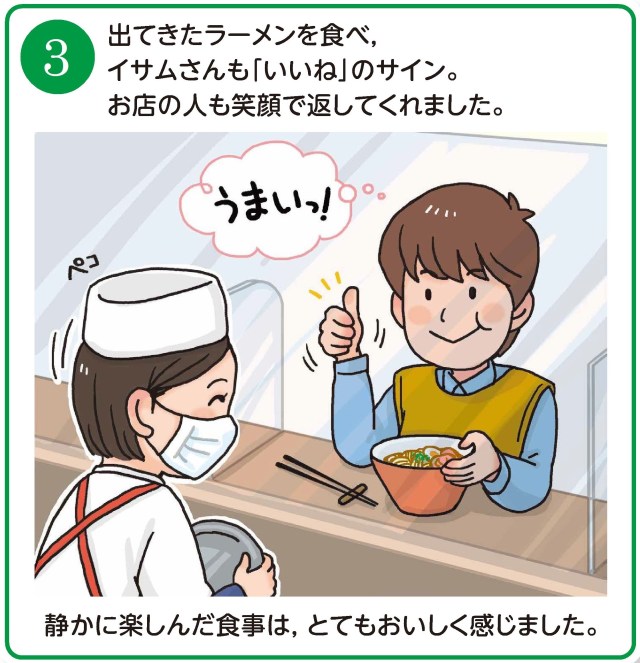
Isamu sees the family leave the restaurant and it’s only then, when they’re outside with their masks covering their faces that they talk to each other, saying that the meal was delicious and they’d like to come back again. This last panel encourages everyone to “Do what you can when you can, bit by bit”.
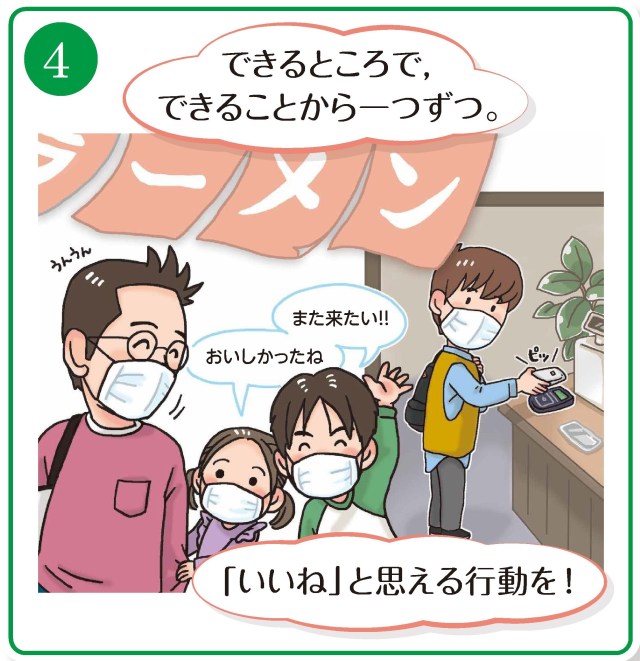
The panel makes things pretty straightforward, laying out step-by-step alternatives to speaking for anyone confused by what mokushoku means, and Kyoto is keen for everyone to follow these guidelines when dining out.
However, what sounds good in theory might not be so great in practice, as a surprisingly large number of people were quick to criticise the idea online, saying:
“Wow, this doesn’t sit well with me.”
“I’m honestly surprised that the city’s PR team is sending out this kind of thing.”
“Seeing Kyoto send out messages like this makes me not want to go there.”
“I feel sorry for restaurants in Kyoto. It must be hard for them to have to go along with this because the city is promoting it.”
“So our vocal cords are going to degenerate now?”
“Who wants to eat out if you can’t talk? I don’t want to go to a place where I’d feel afraid to talk.”
While some people were put off by the city’s requests for silent eating, others were put off by the opposition to it, saying:
“I don’t understand why this is getting so much criticism. Isn’t the city just trying to protect everybody?”
“This is the best way to save both the economy and the medical system right now.”
“Once you get used to mokushoku, even children can do it–it’s really not that difficult.”
“There’s too much anti self-restraint going on right now.”
“There are a lot of idiots who don’t understand that talking without a mask can spread the virus. No wonder it’s still spreading.”
It’s sad to see the city’s efforts to reach out to people and educate them on an important issue is falling on a lot of deaf ears, especially when they went to the trouble of creating a lighthearted manga to make the heavy topic more approachable.
Hopefully more people than not will be willing to abide by Kyoto’s requests for silent eating though, because, as they say, doing what we can when we can will go a long way towards making a big difference. And if silent eating is going to help other customers feel safer when dining out, that’ll lead to more diners and better business for owners, which is particularly important when so many longstanding businesses are sadly being forced to close their doors.
Source: City of Kyoto via Hachima Kikou
Featured image: Pakutaso (edited by SoraNews24)
Insert images: City of Kyoto
● Want to hear about SoraNews24’s latest articles as soon as they’re published? Follow us on Facebook and Twitter!
Credit:

0 comments: